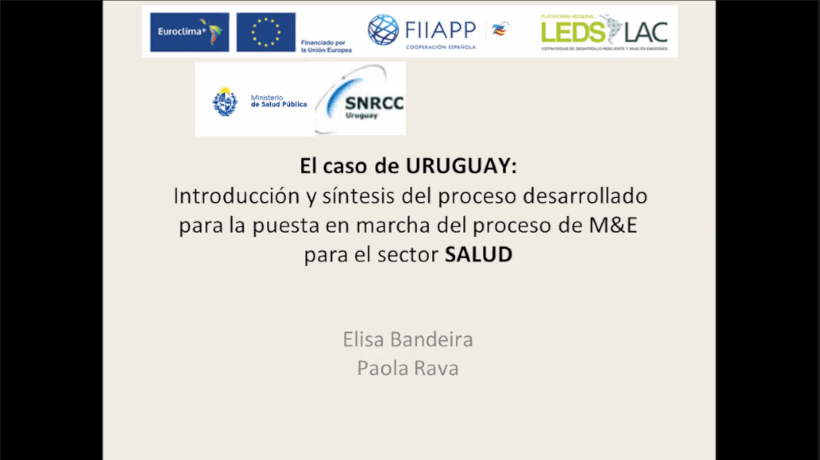17th Virtual Exchange Session of the Climate Policy Monitoring and Evaluation Community of Practice
On Thursday, August 13, the 17th virtual exchange meeting of the Community of Practice for climate policy monitoring and evaluation (CoP M&E) took place, facilitated by the EUROCLIMA+ Programme, through the FIIAPP Foundation, and the LEDSLAC Platform.
This initiative emerged in 2018 to address the need identified in the countries of the Region, for robust, well-constructed and practical systems for the monitoring and evaluation of climate policies and their action plans. These systems are key to improving the effectiveness and efficiency of adaptation and mitigation processes, incorporating new information and lessons learned, and for verifying and reporting transparently on compliance with commitments made under the United Nations Framework Convention on Climate Change, the Paris Agreement, and other multilateral agreements.
The session was dedicated to learning about perspectives and implementation of M&E systems for sectoral climate policies and allowed for an in-depth exploration of the challenges posed by sectoral monitoring of climate change measures.
First, the most recent background and implications for the treatment of the sectors from the IPCC's indications were addressed by Alvaro Zopatti, a climate change specialist who has represented Argentina before the IPCC for 9 years. During his presentation, he presented the most recent background and implications for the treatment of the sectors that RA6 will have the AR6 (sixth IPCC joint analysis report + outline of the summary for decision makers). Alvaro pointed out the global nature of the IPCC reports, highlighting their comparative usefulness for the countries, the possibility of contributing to methodological development, as well as the contribution of possible perspectives on climate policies. His intervention helped to define the conceptual framework that justifies the work of Monitoring, Reporting and Verification articulated by sectors.
For her part, and from a more general and strategic view, Elisa Bandeira of the Ministry of Public Health of Uruguay shared the evolution and progress of Uruguay in the area of climate change and health. Since 2004 the country has been working on integrating climate change adaptation elements into health measures in its policies and reporting. Elisa presented the actions for Monitoring and evaluation of progress in the implementation of mitigation and adaptation measures in the framework of the National Policy on Climate Change (NPCC), which the EUROCLIMA+ programme is supporting through the specialist consultant on Climate Change and health, Paola Rava.
Under the framework of this action, work has been done with the different actors of the National System for Response to Climate Change and with authorities of the health sector, in order to advance both in the preparation of roadmaps for the implementation of the measures related to the health sector included in Uruguay’s NDC, and in defining indicators for them, under the framework of the monitoring system for Uruguay’s NDC.
In her presentation, Paola Rava highlighted the importance of the territorial variable in the management of climate change impacts on health; it is necessary to know the particularities of each territory. With regard to the M&E of health measures, the need to define indicators that are sensitive and specific was also highlighted, with the attribution of certain health impacts to climate change being difficult due to the variety of factors involved.
During the session, which was attended by 32 members of the community of practice with different functions in the Ministries of the Environment, sectoral, planning, and others from several countries in the Region, a space for joint construction was developed through a participatory dynamic in which we were able to delve into the shared challenges of M&E for measures to combat climate change from the sectors. All participants stressed the need to also advance the participation of all actors in the health sector in the problems and particularities of climate change management.
About EUROCLIMA+
EUROCLIMA+ is a programme financed by the European Union to promote environmentally sustainable and climate-resilient development in 18 Latin American countries, particularly for the benefit of the most vulnerable populations. The Programme is implemented under the synergistic work of seven agencies: the Spanish Agency for International Development Cooperation (AECID), the French Development Agency (AFD), the Economic Commission for Latin America and the Caribbean (ECLAC), the German Society for International Cooperation (GIZ) GmbH, Expertise France (EF), the International and Ibero-American Foundation for Administration and Public Policies (FIIAPP), and UN Environment.
Contact
Daniel Fernández: This email address is being protected from spambots. You need JavaScript enabled to view it.
